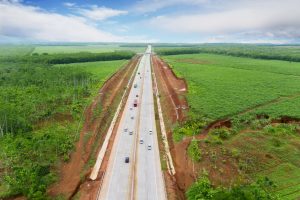One of Indonesia’s largest state-owned construction companies, Waskita Karya, has found itself struggling lately. With construction seeing a slowdown due to the pandemic, the company posted a loss of IDR 9.5 trillion in 2020. One of its subsidiaries, a concrete company called Waskita Beton Precast, recently had a court postpone payment of their debts which include, among other things, nearly IDR 2 trillion in bonds coming due which the company is struggling to pay.
Waskita has been a major player in Indonesia’s infrastructure-led development under President Jokowi, particularly in the country’s toll road sector where it has not only built hundreds of kilometers of new highways but also owns the concession rights to collect tolls on many of them. Waskita has financed much of its construction activity with debt, and as of third quarter 2021 had IDR 89.9 trillion ($6.3 billion) in total liabilities.
This leads to two questions. One, what happened? And two, is it likely to spread to other state-owned companies and undermine Indonesia’s larger economic development strategy which relies heavily on SOEs and debt to build infrastructure?
To answer the first question, there are two main reasons Waskita is bearing the brunt of tightened economic conditions. One is that its concrete subsidiary was investing heavily in more production capacity when the pandemic hit. From 2015 to 2019 Waskita Beton Precast sunk IDR 4.46 trillion into expanding production, and it tapped capital markets – including issuing bonds and additional stock – to pay for this.
The pandemic caught the company flat-footed, as there was now less demand for the increased capacity that they borrowed several hundred million dollars to build. But as long as construction activity and demand for concrete pick up in the future, long-term prospects should improve. Prior to the pandemic, Waskita Beton had reasonably healthy earnings year over year. Had there been no pandemic, I think they probably would have been able to repay the bond obligations on time.
The fact that Waskita Beton is dragging down the parent company’s earnings and balance sheet does speak to a potentially larger issue with Waskita Karya, which is that it is over-extended and precariously dependent on short-term debt. Over the last few years Waskita has been booking billions of dollars in construction contracts, mainly from the government and other SOEs, as Indonesia kicked off a building spree under Jokowi. In addition to toll roads and concrete, Waskita has invested in commercial real estate and power plants. Revenue ballooned from IDR 10.3 trillion in 2014 to 48.8 trillion in 2018.
But toll roads are where it has focused most of its efforts. From 2015 to 2020 the company spent IDR 61 trillion ($4.25 billion) in cash obtaining rights to various toll road concessions, many of which it is also building. These concessions run for decades, so the large initial outlays of cash are meant to be repaid over time through toll road profits. But they are not paying much yet, as many remain under construction or only partially operational. Waskita’s toll road revenue in 2019 was IDR 488.8 billion, and it fell off even further in 2020 with pandemic-related travel restrictions.
To cover the costs of all this activity, Waskita has borrowed heavily. At the end of 2020, the company was carrying IDR 23 trillion in long-term bank loans and 9.7 trillion in outstanding bonds. But its biggest exposure was short-term bank debt, at IDR 24.9 trillion, much of it from state-owned banks. It is not unusual for construction companies to use short-term working capital loans to smooth out cashflow, since they deal with multi-year projects where payments arrive at irregular intervals.
But given the amount of cash needed to purchase toll road concessions and that toll roads themselves as income-generating assets are a long-term investment, that much short-term debt greatly increases vulnerability to any sudden stop in cashflow. The pandemic, which in 2020 caused construction revenue to drop by about 50 percent, was such a shock.
To the bigger issue of whether this is the first domino to fall in a wider systemic contagion, as state-owned construction companies go Waskita was particularly over-extended and reliant on short-term debt. Hutama Karya, another state-owned construction company that has been building and operating toll roads, also booked a loss in 2020 but only had IDR 2.89 trillion in short-term bank loans leaving them in relatively sounder financial position. Hutama’s toll road holdings are also more profitable, generating more than IDR 2 trillion in revenue in 2020.
So it’s not clear that Waskita’s experience is generalizable to all Indonesian SOEs or even other state-owned construction companies. What is pretty clear is that they need to reduce their reliance on short-term debt and that they, more than most of their peers, need a constant stream of new contracts coming in. Is this a business model that is sustainable in the long-run, especially in Indonesia’s construction industry that is heavily protected from competition? I don’t know. But incidentally, a contract for building, say, a brand new capital city would help alleviate some of these financial pressures without necessarily having to answer the hard questions.

































